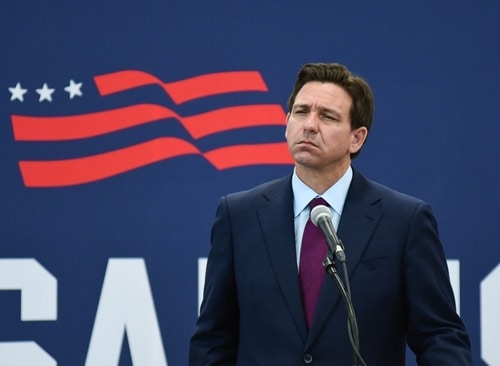Florida Governor Ron DeSantis, while addressing Republican Jewish leaders at the Republican Jewish Coalition (RJC) summit in Las Vegas, highlighted his recent actions, particularly in response to the Israel-Hamas War that erupted in the wake of Hamas’ attack on Israel. DeSantis, who is running for the 2024 presidential nomination as a Republican candidate, enjoys certain advantages over his rivals due to his current position as the governor of Florida, a state with a significant Jewish population and Republican-controlled legislative bodies.
In the aftermath of the conflict, DeSantis took several notable steps. Shortly after October 7th, he organized evacuation flights from Israel, successfully bringing back 700 individuals, primarily Florida residents, who were stranded in the region. This response contrasted with the slower and less decisive action by the U.S. federal government, which only evacuated people to Greece and billed them for their flights. Florida also dispatched two cargo planes loaded with donated relief supplies, including medical equipment and clothing, to aid Israel during this challenging time.
Governor DeSantis took a strong stance against Iran and President Joe Biden’s approach toward the Iranian government. In response to Hamas, which Iran backs, DeSantis called a special legislative session to strengthen Florida’s business sanctions against Iran, a move aimed at curbing the financial support for Hamas.
On the domestic front, DeSantis prioritized the safety of Jewish institutions by mobilizing law enforcement to provide enhanced protection for Jewish schools, synagogues, Holocaust museums, and other Jewish facilities. Additionally, he decided to decertify Students for Justice in Palestine, a pro-Hamas group active on college campuses, as a recognized organization within Florida’s universities.
During his speech, DeSantis emphasized the importance of safeguarding free speech while not permitting material support to terrorists. He stated that although individuals have First Amendment rights, they do not have the right to provide material support to terrorist organizations like Hamas.
DeSantis also addressed rising campus antisemitism, recounting a recent incident where Jewish students were barricaded inside a library at Cooper Union while facing threats from pro-Palestinian protesters. He expressed concern over the growing trend of celebrating terrorists and open antisemitism on college campuses.
Furthermore, DeSantis was critical of the idea of accepting refugees from Gaza, citing concerns about the indoctrination of hatred against Jews and Israel among young people in the region. He argued that importing individuals with toxic ideologies would not serve the best interests of the United States.
Governor DeSantis’s speech also touched on the Biden administration’s foreign policy, particularly its approach to Israel. He accused the administration of undermining Israel’s right to self-defense behind the scenes while publicly expressing support. He raised concerns about aid money potentially being used for illicit purposes by Hamas.
DeSantis stood out from his Republican rivals by opposing certain narratives, such as pressuring Israel to accept a two-state solution and using the term “Judea and Samaria” instead of the “West Bank” to refer to the contested region. He firmly supported Israel’s right to defend itself and emphasized the importance of a strong U.S.-Israel alliance.
In summary, Governor Ron DeSantis used his speech at the RJC summit to showcase his recent actions and strong support for Israel in the face of the Israel-Hamas War. He highlighted his efforts to assist Israelis, strengthen sanctions against Iran, and protect Jewish institutions while also expressing concerns about rising campus antisemitism and the potential consequences of accepting refugees from Gaza.









